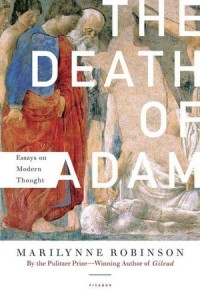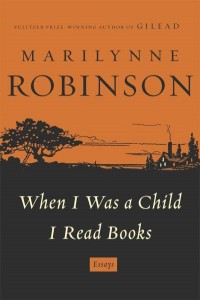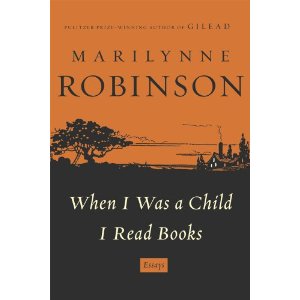 For my (admittedly scarce) money, Marilynne Robinson is the best American religious author alive today. Period.
For my (admittedly scarce) money, Marilynne Robinson is the best American religious author alive today. Period.
Along with her Pulitzer Prize-winning novel Gilead, Robinson is also a prolific essayist on matters religious (her “Psalm Eight” from The Death of Adam is truly spectacular), and even showed up once on the Daily Show to discuss her Absence of Mind essay collection.
Robinson’s essays always cover vast intellectual terrain, from the merits of philosophical arguments for God’s existence to the irruption of the numinous into everyday life. Reading her is like a roller coaster climbing towards “where is she headed with this?” and accelerating down into a breathtaking insight and the thrill of “how’d she do that?!”
 Commonweal has a selection, “Imagination & Community” from Robinson’s next essay collection, When I Was a Child I Read Books, set to be released this month. This essay is as wide-ranging as it is rewarding, offering gems on the formation of community, the purpose of education, the life of readers and writers, and the life of faith. One particularly powerful insight concerns the peril of narrowing one’s identification with a religious community to avoid its historical errors:
Commonweal has a selection, “Imagination & Community” from Robinson’s next essay collection, When I Was a Child I Read Books, set to be released this month. This essay is as wide-ranging as it is rewarding, offering gems on the formation of community, the purpose of education, the life of readers and writers, and the life of faith. One particularly powerful insight concerns the peril of narrowing one’s identification with a religious community to avoid its historical errors:
Those of us who accept a historical tradition find ourselves feeling burdened by its errors and excesses, especially when we are pressed to make some account of them. I would suggest that those who reject the old traditions on these grounds are refusing to accept the fact that the tragic mystery of human nature has by no means played itself out, and that wisdom, which is almost always another name for humility, lies in accepting one’s own inevitable share of human fallibility.
Robinson’s hope, “[[t]]he great truth … that it is in the nature of people to do good to one another,” doesn’t turn on our ability to defend our traditions against attack — but rather on the good that arises from, and returns us to, our participation in inevitably imperfect communities.


